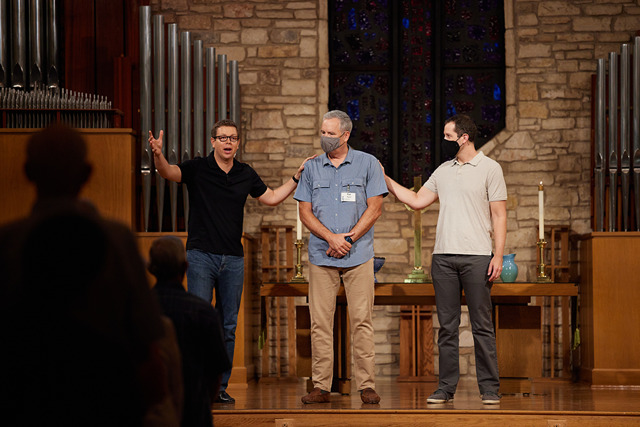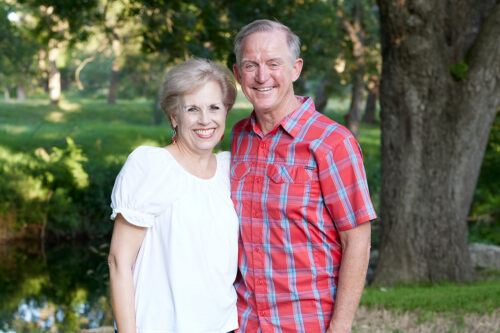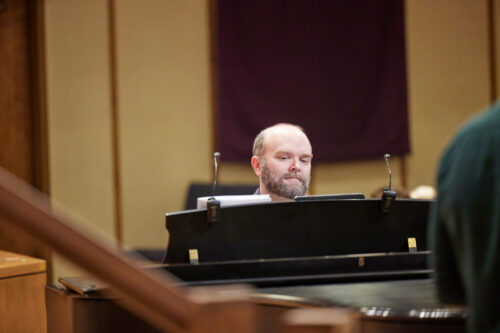Combining Faith and Work, Team Founders Committed to Cause
Thomas Daniel said in a recent worship service that we live “bifurcated lives.” He explained that we often act one way with our small group or our church friends, and we act another way with our work and college friends. For the most part, he said, we are comfortable with these two separate streams.
But, he asked, “What if we live an integrated life where God has you seven days a week for a purpose?”
The Covenant Love Letter Fund (LLF) encourages members to do just that – explore the flourishing of our city by integrating their work and their faith. Through this initiative, Covenant will provide financial support to members and friends with business ideas to make positive change in our city. Last weekend, Covenant announced that our Love Letter Fund Committee has selected The Margin Institute, founded by three Covenant members to provide microloans to refugees, as a fund recipient.

Margin Institute
Dan Michel, Dan Pucci and Matt McMichen are Covenant members who met through small group connections. Combined, this trio has more than 80 years of financial and business development experience. Michel is a seasoned CPA who has started several businesses, including software companies. Pucci’s career has been in business development; he currently works in healthcare technology. He has also worked with non-profits in the Midwest, serving the Native American population in South Dakota and underserved Youth in Chicago. McMichen is a controller and CPA with 10 years experience with “hyper-growth” startups.
When Michel first heard about the Love Letter Fund, he wondered, “What does my faith have to do with finance and vocation? What would this mean for someone like me and my industry?”
Rather than ponder this alone, he considered it with his small group. Another member, Pucci, said he’d been thinking about the same thing and offered to help flush out the idea. A third group member, Chuck Volk, suggested the two connect with McMichen, a younger tech executive who had expressed similar interest.
“These three all have different business backgrounds. The idea had been brewing in each of them to try to do something outside their normal business to care for the vulnerable in our city,” Covenant Mission Director Whitney Bell said.
“We have collectively been on a journey to use our God-given skills to assist the underserved in their daily lives. Each of us has cultivated skills in our business careers that we can utilize to help others,” the group said in their LLF application.
“There has never been a time in our history as a city where social diversity has been greater, yet the opportunities for the lesser served of those diverse populations are less available. Our refugee population may represent the least served of this marginal population,” they continued. “Margin Institute intends to address the challenges these refugee people face by giving them access to financial opportunities that they will not find elsewhere.”
Michel said that the team’s concept, since applying, has changed very little, if at all. “Prior to applying for a LLF grant, we were focused on lending to the underserved. As we discussed how to reach this group, we realized it was both large and broad. Once we heard about the refugee team at Covenant, we thought working with them would help us identify candidates, and engage another ministry within Covenant.”
The Journey to Funding
Last fall, Covenant received 17 applications for the Love Letter Fund. While Thomas said they were all “amazing,” some of the ideas fit better with the ideals of the fund. “A few fit in exactly as we saw,” he said.
The Margin Institute was invited to present to the LLF committee. The LLF committee liked their idea, but felt the team needed to further flush out their business plan before moving to the next step.
By the time Whitney met with the team a couple months later, their commitment was evident. “When we met again, they had done all the things they needed to do to launch a business. They had met with Refugee Services of Texas, they met with our refugee team, and they had met with a micro-loan company. The Love Letter Committee invited Margin back to again pitch their idea and decided to fund the business.”
McMichen said that the team had help from several Covenant members, including Derry Swanger. “Derry is an attorney in our small group. He helped us with our filings with the State of Texas and reviewing our tax-exempt application for the IRS.”

The Margin Learning Curve
Additional Covenant experts serve as mentors for the team, including member Jewel Stone. Jewel is director of partnerships for JUST, a nonprofit financial platform that works to close the racial wealth gap by investing in Texas women through capital, peer coaching and community. Jewel began working with the team last spring and has shared her insights and knowledge about micro-lending rules.
“Jewel helped us understand the details of micro lending,” Michel said. “We are still learning, but she was able to speed up the process of moving from theory to practice. For example, how do we get funds to loan recipients? How will we receive the payments from our clients? Jewel has filled in some of the blanks.”
Through their own research, Margin team members were able to better target their intended loan recipients. “The candidates we are currently working with have been in the U.S. for at least a couple of years,” Michel said. “It makes sense that recent refugees would need to focus on basic needs, like housing, before considering any business startup ideas. We don’t have a requirement that refugees have to live for a certain number of years.”
“Many of the refugees Margin will help are people who been here for a while; people who are not thinking ‘survive,’ they’re thinking ‘thrive,’” Whitney said.
“Often, these will be refugees who have the skills and expertise, but don’t know how to get started. They might need a laptop or a lawnmower, or the funds to rent a booth because they are hair stylists. People could also borrow money to go to trade school or driving school.” Whitney explained that refugees fled their countries with nothing. They often have to repay the U.S. government for their travel expenses. They have no credit and are unable to get loans from banks.
“Margin will invest in people clearly at or in the margins,” the team said. “Without our services, many of these people would not have the financial opportunity available to them to begin a business to support their loved ones. Our faith-based lending principles provide low or no cost loans … and strong spiritual sustainability for these individuals as they treated with love and care by Margin Institute, as we ‘walk the walk’ to deliver Christ’s message to the community.”
Off and Running
Thomas said the team is off and running. “Margin is already in the midst of running the first round of applications for loans for refugees here in Austin.”
“We have had three people apply for loans,” Michel said. “We are actively engaged with two of the applicants – having a dialogue with them to understand how they will use the loan. This process also involves the Margin Institute team making suggestions for how they may get started with less cash than they have requested. For example, can they rent some equipment, versus buying, in order to prove out the concept?”
“It’s a really cool idea. And these three were moving ahead with their plans with or without Covenant,” Whitney said. “This is exactly why the Love Letter Fund was created. These are three guys using their expertise in business and finance for something bigger than making a living; to care for people.”

The Love Letter Fund
A few years ago, Covenant’s Session, two different committees and staff members considered: What are the needs of the city and how can we think differently about how we respond?
After much research and consideration, the church established the Love Letter Fund. Through this fund, Covenant invests in people who want to make positive social change in Austin live out Covenant’s mission to follow Jesus where they live, work, and play. “This is unique and different than anything else I know that is taking place anywhere in the country,” Thomas said.
“Our goal is to provide financial support for businesses that serve a higher purpose,” said Covenant member Ethan Burris, a professor of management at the University of Texas at Austin and chair of the LLF committee. “We will create, incubate and support nonprofits and social ventures that meet the missional needs of Covenant and positively influence our community and the City of Austin,” Ethan explained.
The program leverages Covenant’s wisdom, expertise and values in order to provide support for social entrepreneurs and nonprofits building products and services that benefit disadvantaged people in Austin.
Through the fund, Covenant flips the traditional mission model. “Rather than saying you need to come and serve here, we will want to go where the thousands of people in the Covenant orbit live, work and play, and ask, ‘How can we support you to live out our vision statement?’ How can we provide resources for you to think creative about what it means to be a person of faith?’” Thomas said.
The leaders of The Margin Institute and their program are an example of this. “They started with a burden: ‘What does God want to do in my life and how do I want to solve this bifurcated – here’s my work, here’s my faith – kind of world?” Thomas said. “They prayed, naming that in front of God: ‘I have a burden can’t shake this. I don’t have a plan, but I have a burden.’ They went to their small group and started talking about it in community. Others said they could help. All of the sudden, the burden started getting refined into a vision and into a plan. Now they are out there seeking to serve in areas of needs.
“These guys have an excitement and a passion and a sense of call about what God is doing and they are charging out there to use their skills to make a difference and it is an inspiring thing to watch and learn from,” Thomas said.
Michel said, “Like any new venture, it is both exciting and challenging. We all feel convicted to help new Austinites take charge of their financial lives by expanding or starting a business.”
Learn more about the Love Letter Fund and find updates about the timing of our next application period here.




